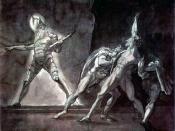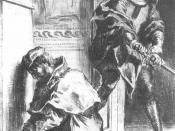Shakespearean literature is often seen as one of the most difficult texts to decipher and extract true and definite meaning from. One particularly ambiguous tale is the renowned tragedy of Hamlet. In short, Hamlet showcases a prince, of the same name, on a quest to avenge the perceived "murder" of his father. However, the exact matter which is of great perplexity is a partial insanity adopted by Hamlet throughout the play and is frankly witnessed by all, save but a few characters of the play. To this some believe it is a simple matter of masking Hamlet's true intentions through a show of insanity, whilst others argue that this madness is authentic and Hamlet is therefore unable to prevent the display of his insanity. However, prior to exploring the notion of his sanity versus insanity, it is imperative to be aware of the meaning of insanity and what it may signify for Hamlet.
As defined by the Oxford Dictionary, the term insane refers to one who is irrational, senseless, mentally deranged, immoderate, very foolish either temporarily or permanently. Thus, Hamlet, can surely apply to any or perhaps all of the definitions, but as there is no constriction in terms of time, it is very possible for Hamlet to endure lucid moments and rational thoughts despite being insane. Interestingly, the genius of Shakespeare is once again revealed, as there simply does not exist any correct interpretation and furthermore both arguments regarding his sanity or insanity must therefore deemed valid. Essentially the divergent views emerge from each reader's personal take of the tale and the genuine responses to Hamlets melancholy state and circumstance. It is therefore apparent that factors such as age, gender and marital experiences will be directly correlated to the reader's response to the tragedy of Hamlet, and in particular Hamlet's state of mind. This applies wholly to my response of situations in comparison to my aunt's, who is not only much older but also married. Essentially, three pivotal events of the play namely, the ghost scene with Hamlet's confrontation, the closet scene and finally the grave digger's scene all showcase Hamlet with a questionable sense of judgment.
****Why my aunt is differentThe famed ghost scene shows Hamlet initially acquainting himself with the ghost at the castle alongside two night watchmen and Horatio. However the actual dialogue between the ghost and Hamlet occurs in the secrecy of a misty and mysterious forest. Skeptics of the ghost such as my aunt state that, "While the existence of this ghost may be plausible, it is a great deal more absurd and unlikely." However, in response to this many including myself argue that the actual sighting of the ghost was confirmed by not only Hamlet but also two night guards and the praiseworthy Horatio. Interestingly, my aunt argues, that although many may have apparently seen the ghost, Hamlet was the sole individual able to converse with it and therefore his account alone is not only questionable but may be utterly false. Additionally, Hamlet who tends to be a high strung individual simply never approved of the marriage of his uncle and mother, yet was unable to vocalize a rationale to justify its illegality. Thus, the ghost who offers the sole reason and only valid proof to end the adverse marriage is seen as an excuse. Furthermore, my aunt would say, which sane person firstly converse with a ghost and secondly base most of their actions on its mere advice? Hamlet's blind desire for vengeance is clear as he says, "I'll wipe away all trivial fond records, all saws of books, all forms, all pressures past, That youth and observation copied there; And thy commandment all alone shall live."(1.5.104-107) Although, my aunt is convinced that the ghost is a figment of Hamlet's imagination, or rather obsession, Hamlet voiced reason and rational thought when considering the ghost, "The spirit that I have seen May be the devil: and the devil hath power to assume a pleasing shape; yea, and perhaps out of my weakness and my melancholy, As he is very potent with such spirits, Abuses me to damn me." (2.2.609-615) Thus, it is apparent that Hamlet questions the integrity of the ghost which shows rationality but more importantly a level-headed sanity. Thus, it is upon the reader to decide what they may make of the event, perhaps the closet scene may shed light on the issue.
The closet scene in general showcases an angry and hostile Hamlet who not only accidentally murders an innocent individual but is moderately incestuous. This scene despite being famous for the murder of Polonius, is also a great example of the exemplification of the oedipal complex. The complex is a theory telling of an individual with reserved desires for a parent of the opposite sex. This scene is in particular offers evidence of this complex and from my aunt's perspective furthers the notion of Hamlet's insanity. A prime example of Hamlet's incestuous desires is his recommendation and response to his mother's request to help him. He retorts, "Not this, by no means, that I bid you do: Let the bloat king tempt you again to bed."(3.4.183-184). This odd and possessive instruction represents Hamlet's instability as rather asking his mother to help garner evidence against the murderous Claudius, he requests that she not sleep with him. This in itself, according to my aunt and likeminded critics cements the existence of the oedipal complex, which indirectly supports the notion of his insanity. However, from a different perspective, one could consider that Gertrude sleeping with Claudius would be a testament to her faith in him and if she was to be faithful to her former husband, herself and perhaps even her son it would not be unreasonable to demand that she would not sleep with him. Additionally, Hamlet is very upset at the actions of his mother and while it is legal for her to get married to Claudius, it is highly immoral. Thus, where my aunt would argue Hamlet expresses a compulsive jealousy and partial insanity, I personally believe that his reaction while perhaps excessive is reasonable given the odd and unfortunate circumstance.
The grave digger's scene although being quite humorous, as only Shakespeare may afford, was also quite serious and possibly melodramatic. Essentially, this scene exposes a highly sentimental aspect of Hamlet in which he expresses his initial fear of death and slowly embraces it upon speaking to the skull of Yorick, a great jester, now reduced to earth and bones. Hamlet is shown to be nostalgic of his childhood and longs for the abundant affection he received as a child. Nevertheless, he understands that death is inevitable and eventually all will perish, "To what base uses we may return, Horatio! Why may not imagination trace the noble dust of Alexander, till he find it stopping a bung-hole?" (5.1.199-201)This coherent thought while unwarranted shows both a softer and more philosophical sides to the young Hamlet and allow the reader to witness a sense of maturity and purpose in his words. Yet, contrary to this when confronted by the King, the Queen and Laertes, Hamlet acts foolishly to express his extreme passion for Ophelia. "Swounds, show me what thou'lt do. Woo't weep? Woo't fight? Woo't fast? Woo't tear thyself? 255 Woo't drink up eisel, eat a crocodile? I'll do 't."(5.1.279-282). To this both Claudius and Gertrude aptly respond, "This is mere madness." (5.1.290). His obsession to prove his intentions and his love are not only immature but quite inappropriate. This shows, that his mind is unstable as he switches moods from a playful tone, to a serious one and finally back to imprudence and "madness." As an aside, my aunt also commented that it is interesting to note that Ophelia who committed suicide becoming insane from the grief of her father's death, can be directly compared to Hamlet, whose father was also murdered and similarly Hamlet became full of misery and hatred. Thus, it would not be unreasonable to infer that Shakespeare made the lovers endure the same tragic fate to indicate that they possess similar if not the same states of mind; they both became insane.
In conclusion, it is apparent that arguments exist on both sides and there can be no correct interpretation. Furthermore, numerous reasonable deductions can be made to support his sanity. The first and most essential is Hamlet's uncanny ability to manipulate emotions within others. For instance the mock murder of the play suggested by Hamlet was a mark of sheer brilliance and no insane individual could have crafted such a rational plot. Secondly, the atmosphere and context of ghost was appropriate for its time and therefore would not contest his sanity. Finally, Hamlet's indecision and prolonging of his vengeance demonstrates a great level of self-control. Yet, my aunt believes that despite all this his show of insanity and madness was far too believable to be a mere act. Secondly, nearly all the characters of the play confirm his madness, including his very own mother. Finally,There are surely times in which there is no doubt that Hamlet is acting or applying his assumed antic disposition. This is the case with Hamlet's response to Polonius's identification in which he calls him a "fishmonger,"(2.2.189). Nevertheless, it is uncertain that Hamlet is indisputably sane, in fact his antics may only appear as such, and in truth be the realistic portrayal of his madness. A simple, yet accurate example would be of an individual protesting his sanity after being admitted to an asylum. Thus, in the end the beauty of Shakespeare holds true and neither or I nor my aunt could surely deny that.
http://eamesharlan.org/tptt/hamlet22.htmlHamlet says "How strange or odd some'er shall think meet to put on antic disposition, That you, at such times, seeing me, never shall, with arms encumbered thus, or this head shake, ...." (5.2. 165-180)He tells Horatio he will be acting mad and he mustn't say anything. Never lost sight of his objective to expose the King's sin of murdering his father and obtaining revenge.
is a fictional work it infers many lessons for society to adopt. Gatsby's life which was wrought with selfishness and immorality serves as a reminder that success only comes when individuals commit to practical goals, struggle righteously and never falter to lend a helping hand when needed.
[BOOK] Young Hamlet: essays on Shakespeare's tragediesB Everett - 1989 - Oxford University Press, USAHamlet and his problemsTS Eliot - The Sacred Wood, 1920 - questia.com... new edition with additional essays, 1950). 2, John Mackinnon Robertson ( 1856- 1933)published Elizabethan Literature in 1914 and The Problem of Hamlet in 1920. ...
[BOOK] Hamlet and OedipusE Jones - 1954 - Doubleday[BOOK] TS Eliot on ShakespeareC Warren - 1986 - Umi Research Pr





